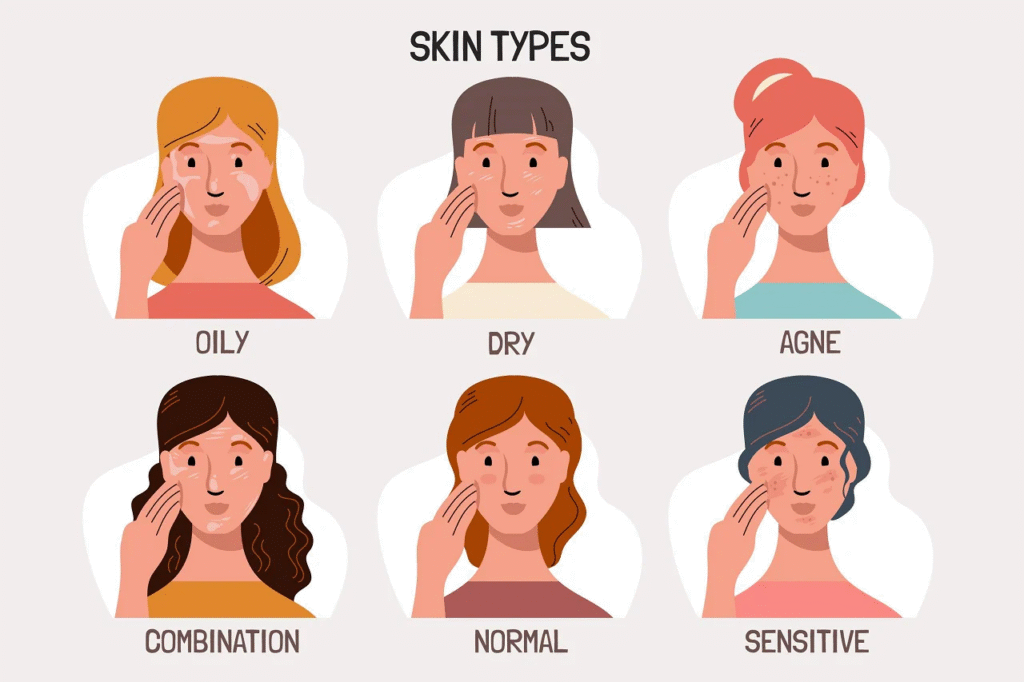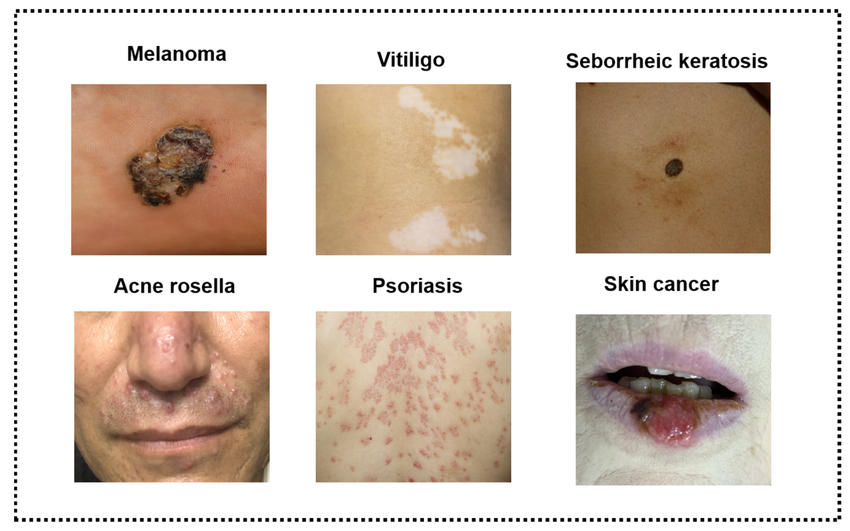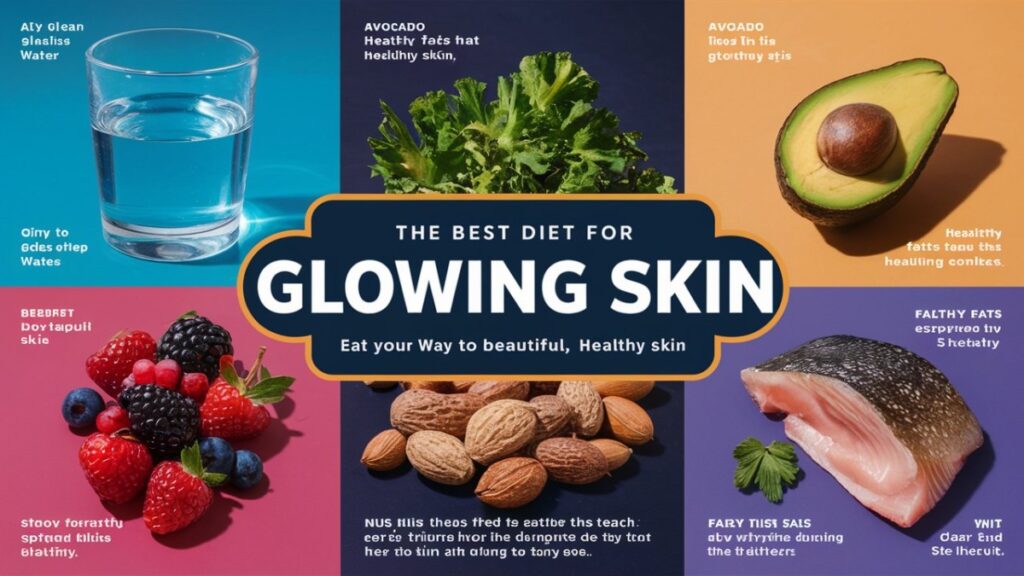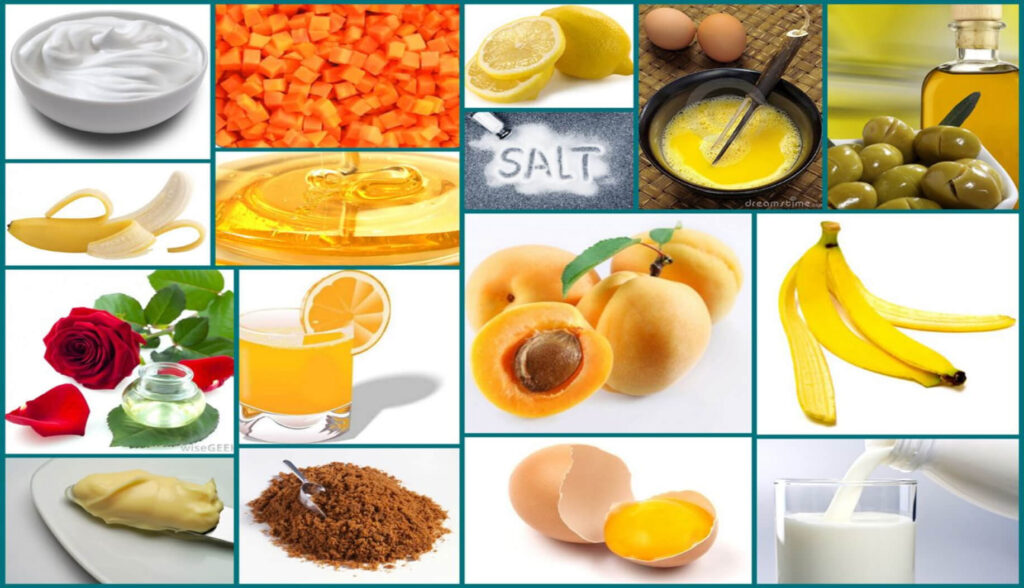
Healthy skin begins with understanding your skin type normal, oily, dry, combination, or sensitive and addressing common problems like acne, eczema, and pigmentation through proper care, diet, and protection. Consistent cleansing, moisturizing, hydration, and daily SPF use are key to long-term skin health and radiance.
Key Takeaways
- Identify your skin type before choosing products.
- Maintain skin barrier with gentle cleansing and hydration.
- Use broad-spectrum SPF 30+ daily to prevent aging and damage.
- Eat nutrient-rich foods (omega-3s, vitamins A, C, E, zinc, selenium).
- Avoid harsh chemicals, processed foods, excess sugar, and alcohol.
- Manage stress and ensure quality sleep for repair and glow.
- Seek dermatological care for persistent or severe skin issues.
Understanding Skin Types
Knowing your skin type is the foundation of any good skincare routine. Using the wrong products for your skin type can cause irritation or worsen problems. The main skin types are:

Normal Skin
Normal skin is considered the ideal baseline for skin wellness. It is naturally balanced, meaning it has the right amount of moisture, oil, and elasticity.
- Balanced moisture levels with no excessive dryness or oiliness
- Smooth, even texture with minimal blemishes
- Small or barely visible pores
- Rarely experiences irritation or sensitivity
Care Tips:
- Maintain skin nourishment with a gentle cleanser and lightweight moisturizer
- Use sunscreen daily for protection
- Continue a consistent skin care routine to preserve balance
Oily Skin
Oily skin produces more sebum (natural oil) than the skin needs, which can lead to clogged pores and shininess, especially by midday.
- Shiny look, especially in the T-zone (forehead, nose, chin)
- Larger, more visible pores
- Prone to acne, blackheads, and occasional whiteheads
- Makeup may not last as long due to oiliness
Care Tips:
- Use gel-based, non-comedogenic moisturizers to hydrate without clogging pores
- Cleanse twice daily with a mild foaming cleanser to reduce excess oil without over-drying
- Apply oil-free sunscreen to prevent breakouts
- Incorporate gentle exfoliation 1–2 times a week to prevent buildup.
Dry Skin
Dry skin struggles to retain enough moisture, often because the skin barrier is compromised or natural oil production is lower.
- Feels tight after cleansing
- Flaky or rough patches
- Sometimes itchy or irritated
- More prone to fine lines due to lack of natural oils
Care Tips:
- Use creamy, hydrating cleansers instead of foaming washes
- Apply rich moisturizers containing ceramides, hyaluronic acid, or glycerin
- Avoid hot water when washing the face as it strips oils
- Use a hydrating serum before moisturizer to boost retention
Combination Skin
Combination skin has two or more skin types on different areas of the face. Most commonly, the T-zone is oily while cheeks are dry or normal.
- Shiny forehead, nose, and chin (T-zone)
- Drier or normal skin on cheeks and jawline
- Pores may be more visible in oily zones
- Can have occasional breakouts in oily areas and dryness elsewhere
Care Tips:
- Use different products for different zones (e.g., oil-control in T-zone, richer creams on dry cheeks)
- Choose a gentle, balancing cleanser that doesn’t strip skin
- Hydrate evenly while avoiding heavy creams in oily areas
Sensitive Skin
Sensitive skin reacts easily to environmental changes, products, or even stress. It requires extra gentle care because the barrier function is often more delicate.
- Redness or rashes triggered by skincare, weather, or diet
- Itching, stinging, or burning sensations from certain products
- Flare-ups that come and go
- Can overlap with dry, oily, or combination skin types
Care Tips:
- Choose fragrance-free, alcohol-free, and hypoallergenic products
- Patch-test new products before use
- Keep skincare simple with soothing ingredients like aloe vera, chamomile, or oat extract
- Protect against temperature extremes with appropriate clothing and hydration
Common Skin Problems
Even with good care, skin problems can occur due to genetics, environment, or lifestyle factors. Some of the most common include:

Acne
Acne develops when pores become clogged with excess oil (sebum), dead skin cells, and bacteria. This blockage creates an environment where inflammation occurs, leading to pimples, whiteheads, blackheads, and sometimes cysts. Acne commonly appears on the face, chest, and back. Factors such as hormonal changes, stress, and certain skincare products can worsen acne.
Eczema
Eczema is a chronic inflammatory condition that causes the skin to become dry, itchy, and irritated. It often appears as red patches that may crack or peel. Eczema flare-ups can be triggered by allergens, irritants, weather changes, or stress. The skin barrier is weakened, which makes it more susceptible to dryness and irritation.
Psoriasis
Psoriasis is an autoimmune disorder where the immune system mistakenly attacks skin cells, causing them to multiply rapidly. This leads to thick, scaly patches of skin that can be red or silver. Psoriasis may appear on the scalp, elbows, knees, or other areas and often causes itching or discomfort. It is a persistent condition requiring medical treatment.
Rosacea
Rosacea is characterized by persistent redness on the central face, including flushing and visible blood vessels. Some people also develop small, red bumps or pus-filled pimples resembling acne. Triggers include heat, spicy foods, alcohol, and sun exposure. Rosacea tends to flare and subside over time but requires special skincare and sometimes medication.
Hyperpigmentation
Hyperpigmentation involves dark spots or patches on the skin caused by excess melanin production. It can result from sun damage, acne scars, injury, or hormonal changes such as pregnancy or birth control use. These spots are usually harmless but can affect skin tone uniformity and may fade slowly with treatment.
Fungal Infections
Fungal infections occur when fungi grow in warm, moist parts of the body. Common examples are athlete’s foot and ringworm. These infections cause itchy, red, sometimes scaly patches and can spread if untreated. Maintaining dryness and using antifungal treatments help manage these infections.
Causes of Poor Skin Health
Many factors contribute to unhealthy skin. Some you can control, others you can manage:
Poor Diet: A diet lacking essential nutrients weakens the skin’s natural barrier and repair mechanisms. Without enough vitamins, minerals, and antioxidants from healthy foods, the skin becomes prone to dryness, inflammation, and premature aging. Nutrient deficiencies can also reduce collagen production and slow skin detox, leading to dull and unhealthy skin.
Sun Damage: Overexposure to ultraviolet (UV) rays breaks down collagen and elastin, causing loss of firmness and elasticity. It contributes to sunburn, pigmentation, wrinkles, and a higher risk of skin cancer. Without adequate sun protection, long-term UV exposure drastically affects skin wellness and texture.
Harsh Skincare Products: Products containing strong chemicals like high alcohol content, artificial fragrance, or sulfates strip away natural oils and damage the skin barrier. This can lead to irritation, increased sensitivity, dryness, and inflammation. Prolonged use can worsen skin issues instead of improving them.
Smoking: Smoking restricts blood flow to the skin, reducing oxygen and nutrient supply. It damages collagen and elastin, triggering early wrinkles and sagging. The toxins introduce oxidative stress, resulting in dull, uneven, and prematurely aged skin.
Alcohol: Excess alcohol dehydrates the skin, making it dry and flaky. It also causes inflammation and dilated blood vessels, leading to redness or puffiness. Alcohol weakens the skin’s ability to retain moisture, disrupting overall skin wellness.
Stress: Chronic stress upsets hormonal balance, increasing oil production and inflammation. This often leads to acne flare-ups, eczema, or other irritation. Stress also slows the skin’s natural repair process, contributing to uneven tone, dullness, and aging signs.
Lack of Sleep: During sleep, skin repairs and regenerates itself. Lack of rest disrupts this cycle, leaving skin dull, with dark circles and slower healing of imperfections. Quality sleep is essential for glowing skin and maintaining a healthy skin barrier.
Effects of Unhealthy Skin
When skin health declines, it affects more than appearance. Common effects include:
Premature Aging
Premature aging of the skin is marked by early appearance of fine lines, wrinkles, and sagging, often before the typical age-related changes would normally occur. This happens when collagen and elastin, the proteins responsible for skin’s firmness and elasticity, break down faster than usual. Factors like excessive sun exposure, smoking, poor nutrition, and stress accelerate these effects, leading to loss of skin tone, dryness, and visible signs of aging well before expected.
Frequent Infections
When the skin barrier is damaged or weakened, it becomes easier for bacteria and other pathogens to penetrate, resulting in frequent skin infections. Common bacterial culprits include Staphylococcus aureus and Streptococcus species. These infections can manifest as cellulitis, abscesses, or more severe conditions, particularly when the skin is inflamed, broken, or compromised due to chronic skin conditions or injuries. A healthy barrier is essential to keeping harmful microorganisms out and protecting skin health.
Chronic Discomfort
Unhealthy skin often causes persistent discomfort such as itching, burning, or tightness. This arises from inflammation, dryness, or irritation due to impaired barrier function or underlying skin disease like eczema or psoriasis. Sensory nerves in the skin can become hypersensitive, leading to a constant sensation of discomfort that affects quality of life. Triggers could include allergens, harsh products, infections, or environmental factors.
Self-Confidence Issues
Visible skin problems frequently impact mental and emotional well-being. Conditions such as acne, eczema, psoriasis, or scarring can reduce self-esteem, leading to feelings of embarrassment, shame, and social withdrawal. This negative self-perception can hinder social interactions, daily activities, and overall quality of life. Studies show that individuals with visible skin conditions often report lower self-worth, increased anxiety, and depression, underscoring the importance of addressing both skin health and psychological support.
Signs Your Skin Needs Attention
Your skin often sends visible and physical warnings when it’s under stress or facing underlying issues. Recognizing these early can help prevent more serious problems and protect overall skin health.
- Constant Dryness or Oiliness: If your skin consistently feels tight, rough, or flaky, it may indicate dehydration, a weakened barrier, or insufficient oil production. On the other hand, persistent oiliness can signal overactive sebaceous glands, often linked to hormonal changes, stress, or unsuitable skincare products.
- Recurring Acne or Irritation: Frequent breakouts, rashes, or bumps suggest your skin is reacting to something that could be clogged pores, imbalanced hormones, allergic reactions, or even harsh skincare ingredients. If these issues don’t improve with basic care, it may be time to reassess products and lifestyle factors.
- Redness or Swelling Without Clear Cause: Unexplained redness, swelling, or warmth in the skin can indicate inflammation, allergic reactions, rosacea, or even infection. Persistent redness should not be ignored, as it can signal deeper health concerns.
- Unusual Moles or Skin Growths: Changes in the size, color, or shape of moles, or the appearance of new growths, can be warning signs of skin cancer or other disorders. Moles that itch, bleed, or develop irregular borders should be checked by a dermatologist promptly.
- Slow Healing From Minor Injuries: If small cuts, pimples, or abrasions take unusually long to heal, it may signal poor circulation, uncontrolled diabetes, a weakened immune system, or nutritional deficiencies. Healthy skin typically recovers quickly, so delayed healing is a red flag.
Daily Basics Skincare for Healthy, Glowing Skin
Following a simple yet regular skincare routine ensures your skin stays clean, hydrated, and protected from daily damage. These steps support your skin barrier, reduce the risk of common skin problems, and help maintain a healthy glow.
Cleanse
Wash your face twice daily, morning and night, using a gentle cleanser that suits your skin type. This removes dirt, excess oil, sweat, and impurities without stripping away the skin’s natural moisture. Over-cleansing or using harsh products can cause dryness and irritation, so choose mild, pH-balanced formulas.
Moisturize
After cleansing, apply a moisturizer to keep your skin hydrated and soft. Even oily skin needs moisture to maintain balance and prevent overproduction of oil. Look for lightweight, gel-based options if you have oily skin and richer creams for dry skin. Applying moisturizer on slightly damp skin improves absorption.
Protect
Every morning, use a broad-spectrum sunscreen with SPF 30 or higher, even on cloudy days or indoors if near windows. Sunscreen shields skin from harmful UVA and UVB rays, preventing premature aging, sunburn, and reducing skin cancer risk. Reapply every two hours if outdoors for extended periods.
Best Foods for Skin Health

What you eat reflects on your skin. Nutrient-rich foods for healthy skin include
Fatty Fish
Salmon, mackerel, and sardines are excellent sources of omega-3 fatty acids, which help maintain the skin’s lipid barrier, keeping it hydrated and reducing inflammation. Omega-3s also support skin elasticity and may help calm redness or irritation, making them essential for healthy, glowing skin.
Nuts and Seeds
Almonds, sunflower seeds, and walnuts are rich in vitamin E, a powerful antioxidant that protects skin cells from oxidative damage caused by free radicals. Vitamin E also supports moisture retention, helping skin stay soft and smooth while reducing dryness.
Leafy Greens
Spinach, kale, and similar greens are packed with vitamins A and C. Vitamin A aids skin cell turnover and repair, while vitamin C plays a vital role in collagen production, keeping skin firm and youthful. These nutrients also help protect the skin against environmental damage.
Berries
Blueberries, strawberries, and other berries are loaded with antioxidants such as vitamin C and polyphenols. These compounds fight oxidative stress, protect against premature aging, and brighten the complexion. Regularly eating berries can help maintain an even skin tone.
Avocados
Avocados contain healthy monounsaturated fats that nourish and hydrate the skin from within. They also provide vitamins C and E, which support elasticity, protect against oxidative damage, and keep skin supple and smooth.
Foods That May Harm Your Skin

Certain foods can negatively impact your skin’s health by increasing inflammation, clogging pores, or disrupting your skin’s natural balance. Moderation and mindful choices are key to avoiding these effects.
Sugary Foods
Sugary foods and drinks can increase inflammation in the body, which often shows up in the skin as redness and swelling. High sugar intake also spikes insulin levels, leading to excess oil production and clogged pores, raising the risk of acne. Reducing sugar helps control breakouts and supports clearer, calmer skin.
Dairy Products
Dairy consumption has been linked to acne outbreaks in some individuals, possibly due to hormones and bioactive molecules present in milk. These substances can stimulate oil glands and inflammation, worsening existing acne or triggering new breakouts. People sensitive to dairy may notice clearer skin when reducing or eliminating it.
Highly Processed Foods
Highly processed foods are often loaded with unhealthy fats, preservatives, and additives that can disrupt skin balance. These ingredients may promote oxidative stress and inflammation, contributing to dullness, acne, or other skin issues. Opting for whole, natural foods supports skin detox and general skin wellness.
Excess Salt
Excess salt intake can cause dehydration by drawing water out of skin cells, leading to dryness and dullness. It also contributes to puffiness and swelling by causing the body to retain fluid, which can make the face and eyes appear bloated. Limiting salt helps maintain hydrated, radiant skin and reduces unwanted puffiness.
Vitamins & Nutrients for Healthy Skin
Certain vitamins and minerals are essential for maintaining healthy, glowing skin. Each plays a specific role in skin function, repair, and protection:
Vitamin A
Vitamin A is crucial for promoting skin cell renewal. It helps shed old, dead skin cells and encourages the growth of new, healthy cells. This renewal process keeps the skin smooth and can reduce the appearance of fine lines and rough patches. Vitamin A derivatives, like retinoids, are often used in skincare to improve texture and tone.
Vitamin C
Vitamin C is vital for boosting collagen production, the protein that maintains skin’s firmness and elasticity. It also aids in healing wounds and skin damage by supporting tissue repair. As a strong antioxidant, vitamin C protects against environmental damage like pollution and UV rays, helping to prevent premature aging and dark spots.
Vitamin E
Vitamin E acts as a protector against UV damage by neutralizing free radicals generated by sun exposure. This antioxidant property reduces inflammation and prevents cell damage. Vitamin E also supports skin hydration and can improve the skin’s barrier function, helping to maintain radiant and healthy skin.
Zinc
Zinc plays an important role in reducing skin inflammation and speeding up healing. It helps regulate oil production, which can reduce acne flare-ups. Zinc also supports the immune system, aiding the skin’s defense against infections and promoting faster recovery from wounds and irritations.
Selenium
Selenium supports the skin’s antioxidant defense system by helping to neutralize harmful free radicals. This mineral works alongside vitamins C and E to protect skin cells from damage caused by UV rays and pollution. Adequate selenium intake contributes to skin resilience and overall health.
Natural Remedies and Home Treatments for skin

Natural ingredients found at home can gently improve skin wellness without harsh chemicals. These remedies are generally inexpensive, easy to use, and suitable for most skin types when applied correctly.
Aloe Vera
Aloe vera gel is well known for its soothing and hydrating properties. It helps calm irritation, reduce redness, and promote healing of minor burns, sunburn, or rashes. The gel also contains vitamins, enzymes, and antioxidants that support skin repair and maintain moisture. Fresh aloe from the plant is most effective when applied directly to clean skin.
Honey
Raw, unprocessed honey is both antibacterial and deeply moisturizing. It can help reduce acne-causing bacteria while locking in hydration, making skin feel softer and smoother. Honey’s natural enzymes also gently exfoliate dead skin cells, leaving the skin looking fresh and radiant. It can be applied as a face mask or mixed with other natural ingredients.
Oatmeal
Oatmeal is a gentle yet effective remedy for itching, inflammation, or dryness. It forms a protective barrier on the skin and contains compounds that have anti-inflammatory and antioxidant effects. Colloidal oatmeal baths or oatmeal paste can soothe conditions like eczema, rashes, or general irritation, making it ideal for sensitive skin.
Green Tea
Green tea is rich in antioxidants, particularly catechins, which help protect the skin from damage caused by free radicals and environmental stress. Used topically as a cooled tea rinse or compress, it can reduce puffiness, calm redness, and refresh the skin. Drinking green tea regularly may also promote overall skin health from within.
Impact of Sleep on Skin

Sleep is often called “beauty rest” for a reason it’s a vital time when the body, including your skin, goes through repair, renewal, and rebalancing processes. Healthy, consistent sleep is one of the most powerful (and cost-free) ways to promote radiant, youthful skin. On the other hand, poor or insufficient sleep can quickly show up on your face and, over time, accelerate skin aging.
1. Skin Repair and Cell Renewal
While you sleep, blood flow to the skin increases, delivering oxygen and nutrients more effectively. This enhanced circulation helps repair daily skin damage caused by UV exposure, pollution, and environmental stress. Damaged skin cells are replaced with fresh ones during the deep stages of sleep, keeping your skin smoother, more even-toned, and resilient.
2. Collagen and Elastin Production
During the night, the body produces more collagen, the protein responsible for firmness and elastin, which helps skin snap back into shape. Reduced sleep slows this process, leading to faster development of wrinkles, fine lines, and sagging. Over time, chronic lack of quality rest can make these aging signs more pronounced.
3. Hydration and Barrier Strength
A strong skin barrier holds in moisture and keeps irritants out. Sleep supports the barrier’s ability to retain water, preventing dryness and dullness. If you don’t get enough rest, the barrier weakens, leading to increased transepidermal water loss (TEWL), flakiness, and more sensitivity to skincare products or changes in weather.
4. Hormonal Balance and Inflammation
Lack of sleep raises cortisol (the stress hormone) levels. High cortisol not only breaks down collagen but also triggers inflammation, which worsens skin concerns like acne, eczema, and rosacea. Balanced hormones during restful sleep help keep oil production steady, reducing the likelihood of clogged pores and breakouts.
5. Visible Signs:Dark Circles, Puffiness, and Dullness
Poor or inconsistent sleep affects the blood vessels under the delicate eye area, causing dark circles and under-eye bags. It also increases fluid retention, making the face appear puffy. Additionally, without proper nighttime repair, skin may lose its natural glow and look fatigued.
6. Immune Health and Skin Defense
A well-rested body has a stronger immune system, which means the skin is better at fighting infections, healing wounds, and resisting irritations. Sleep deprivation weakens these defenses, making skin more prone to inflammation, rashes, or slow healing after acne or minor injuries.
How Hormones Affect Skin
Hormones regulate oil production, skin thickness, and healing. Imbalances during puberty, menstruation, pregnancy, or menopause can cause acne, pigmentation changes, or dryness. Managing hormones through lifestyle, diet, and medical care can help keep skin stable.
- Hormones regulate skin oiliness, moisture, thickness, healing, and elasticity.
- Estrogen helps keep skin firm and hydrated; its decline causes dryness and aging signs.
- Testosterone and progesterone increase oil production, leading to acne and oily skin.
- Cortisol from stress triggers inflammation and worsens skin conditions.
- Hormonal fluctuations throughout life stages (puberty, menstruation, pregnancy, menopause) cause noticeable skin changes.
- Managing hormones via lifestyle, diet, stress control, and medical care can stabilize skin health.
Importance of Hydration
Water helps transport nutrients to skin cells and flushes toxins. Dehydrated skin looks dull, feels tight, and is more prone to wrinkles. Drink adequate water daily and use moisturizing products to lock in hydration.
- Water transports nutrients to skin cells and removes toxins.
- Proper hydration keeps skin smooth, plump, and radiant.
- Dehydrated skin looks dull, feels tight, and shows more fine lines and wrinkles.
- Drink enough water daily to maintain internal hydration.
- Use moisturizing skincare products (with hyaluronic acid, glycerin, ceramides) to lock in moisture.
- Limit caffeine and alcohol, as they can dehydrate the skin.
- Protect the skin barrier with gentle cleansers and avoid over-exfoliation.
Choosing the Right Skincare Products
Select products based on your skin type, ingredients, and specific concerns. Avoid products with harsh alcohols, synthetic fragrances, or allergens. Reading ingredient labels and understanding what each component does can prevent irritation.
- Identify Your Skin Type and Concerns: Choose products formulated for your specific skin type normal, dry, oily, combination, or sensitive and address particular issues like acne, dryness, aging, or sensitivity.
- Avoid Harsh Ingredients:Steer clear of products containing strong alcohols (e.g., denatured alcohol), synthetic fragrances, and common allergens that can strip natural oils, disrupt your skin barrier, and cause irritation or allergic reactions.
- Choose Non-Comedogenic and Hypoallergenic Products: These are less likely to clog pores or cause allergic reactions, especially important for oily and sensitive skin.
- Patch Test New Products: Apply a small amount on a discreet skin area before full use to check for adverse reactions.
- Consistency and Gradual Introduction: Introduce new items slowly into your routine to monitor skin response and prevent overload.
Sun Protection and Sunscreens
Ultraviolet (UV) rays from the sun are the primary cause of premature skin aging, including wrinkles, fine lines, and loss of elasticity. UV exposure also increases the risk of skin cancers and causes pigmentation issues such as dark spots.
To protect your skin effectively:
- Use a broad-spectrum sunscreen that guards against both UVA and UVB rays.
- Choose a sunscreen with an SPF of 30 or higher to provide adequate defense.
- Apply sunscreen every day, even on cloudy or rainy days, as UV rays can penetrate clouds.
- Reapply sunscreen every two hours when you are outdoors, and sooner if swimming or sweating.
- Don’t forget often-missed spots such as your ears, neck, hands, and the back of your legs.
- Wear protective clothing, hats, and sunglasses to further shield your skin when possible.
When to See a Dermatologist
Some skin issues require medical attention to prevent complications or detect serious conditions early. You should seek professional help if you experience:
- Persistent rashes or irritation: Ongoing redness, itching, or inflammation that does not improve with basic skincare may indicate allergies, chronic skin diseases, or infections needing prescription treatment.
- Moles that change in color, shape, or size: Any sudden change in a mole’s appearance could be a warning sign of skin cancer and should be examined promptly.
- Severe acne unresponsive to over-the-counter care: Stubborn or painful acne may require stronger, prescription treatments to prevent permanent scarring.
- Skin infections or unusual growths: Signs like pus, swelling, spreading redness, or rapidly growing lumps should be assessed quickly to avoid further complications.
Skin Health Myths and Facts
There are many common misconceptions about skincare that can lead to poor habits and prevent you from achieving healthy, radiant skin. Knowing the facts behind these myths helps you make better choices for skin wellness.
Myth: Tanning protects your skin from sun damage.
Fact: Tanning is a sign of skin injury from UV rays. It does not protect your skin; it increases DNA damage and risk of skin cancer.
Myth: Natural or organic products are always better for your skin.
Fact: Natural ingredients can still cause allergies or irritation. Effectiveness depends on formulation, concentration, and your skin type.
Myth: You should exfoliate daily to keep skin clear.
Fact: Over-exfoliating strips the skin barrier, causing redness, sensitivity, and dryness. Limit exfoliation to 1–3 times a week depending on your skin type.
Myth: You don’t need sunscreen indoors.
Fact: UVA rays penetrate windows and cause aging and damage even inside. Sunscreen is advised if you spend long hours near windows.
Myth: Acne is caused by poor hygiene.
Fact: Acne results from hormonal changes, oil buildup, bacteria, and inflammation, not just dirt. Over-washing can worsen acne.
Myth: Wrinkles only form after age 40.
Fact: Early signs of aging can start in your 20s or 30s, influenced by sun exposure, smoking, and lifestyle.
Conclusion
Healthy skin is the result of consistent care, balanced lifestyle choices, and informed decisions. By understanding your skin type, addressing concerns early, and protecting it from harmful factors like UV rays, harsh products, and poor nutrition, you can maintain its strength, clarity, and radiance. A good skincare routine, nutrient-rich diet, proper hydration, and adequate rest support the skin’s natural repair and defense systems.
Regular sun protection, mindful product selection, and professional guidance when needed are key for long-term skin wellness. With the right habits, your skin can remain healthy, resilient, and glowing at every stage of life.
FAQs
1. How do I determine my skin type?
Cleanse your face, leave it bare for an hour, then observe. If your skin feels tight and flaky, it’s likely dry. If it looks shiny all over, oily. Shine only in the T-zone indicates combination skin. Balanced moisture and small pores mean normal skin. Redness or quick reactions suggest sensitive skin.
2. What are the main causes of poor skin health?
Poor diet, sun damage, harsh skincare products, smoking, alcohol, stress, and lack of sleep can all weaken skin, causing dryness, inflammation, premature aging, and breakouts.
3. How often should I use sunscreen?
Apply broad-spectrum sunscreen with SPF 30 or higher daily, even on cloudy days. Reapply every two hours when outdoors, and remember often-missed areas like ears, neck, and hands.
4. Can I use the same moisturizer for oily and dry skin?
No. Dry skin benefits from rich, hydrating creams, while oily skin needs lightweight, gel-based, non-comedogenic moisturizers to avoid clogged pores and excess shine.
5. What foods are best for healthy skin?
Fatty fish, nuts, leafy greens, berries, and avocados provide vitamins, antioxidants, and healthy fats that support skin hydration, elasticity, and protection.
6. When should I see a dermatologist?
Seek professional care for persistent rashes, moles that change in appearance, severe acne unresponsive to OTC products, or suspicious skin growths.
7. Are natural remedies effective for skin health?
Yes, ingredients like aloe vera, honey, oatmeal, and green tea can soothe irritation, hydrate, reduce inflammation, and offer antioxidant protection when used properly.
8. Can lack of sleep affect my skin?
Absolutely. Poor sleep impairs skin repair, reduces collagen production, weakens hydration, increases inflammation, and leads to visible signs like dark circles and dullness.
Reference
- Mayo Clinic: Skin care – 5 tips for healthy skin
https://www.mayoclinic.org/healthy-lifestyle/adult-health/in-depth/skin-care/art-20048237 - American Academy of Dermatology: Skin care basics
https://www.aad.org/public/everyday-care/skin-care-basics - Healthline: Healthy Beauty and Skin Care
https://www.healthline.com/health/beauty-skin-care - CeraVe: Skincare Routines for All Skin Types
https://www.cerave.com/skin-smarts/skincare-routines - Maryam Beauty Clinic: A Guide to Taking Care of Your Skin
https://www.maryambeautyclinic.ca/post/a-guide-to-taking-care-of-your-skin - MasterClass: Skin Health Series (Dermatologist-led insights)
https://www.masterclass.com/series/skin-health
Aubrey Carson is an RDN with 9 years across hospital, outpatient, and private practice settings. They earned an MS in Clinical Nutrition from Tufts University – Friedman School (2016) and completed a Dietetic Internship at Mayo Clinic. Aubrey specializes in micronutrient assessment, evidence-based supplementation, and patient education. Their work includes CE presentations for the Academy of Nutrition and Dietetics and collaborations with Mass General Brigham on nutrition education resources.

